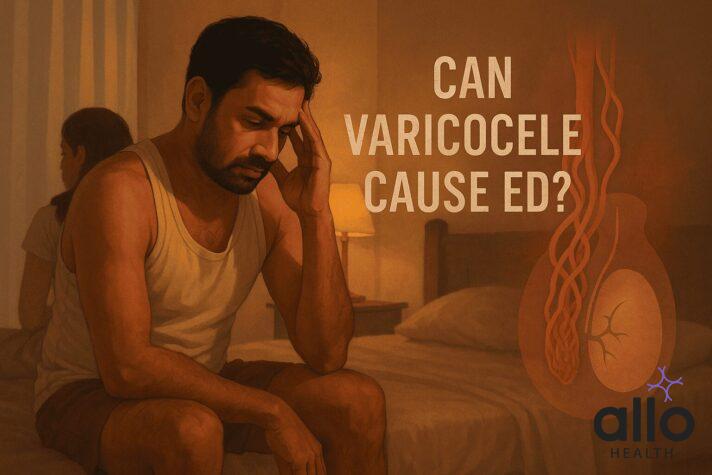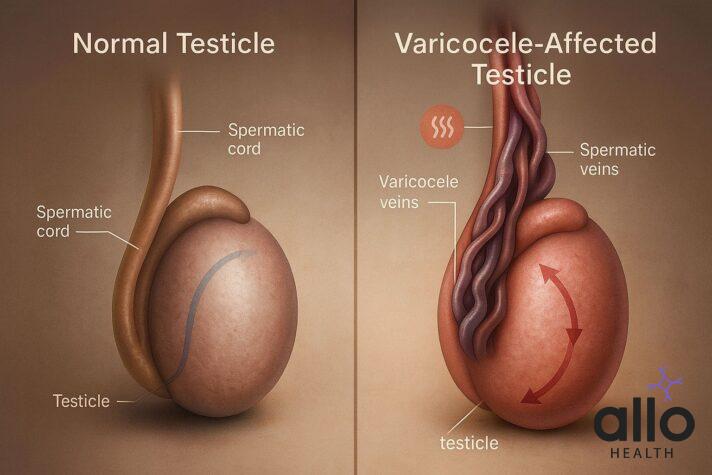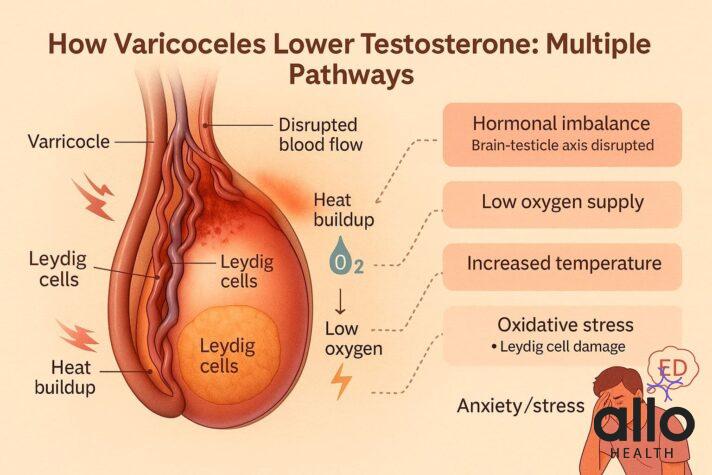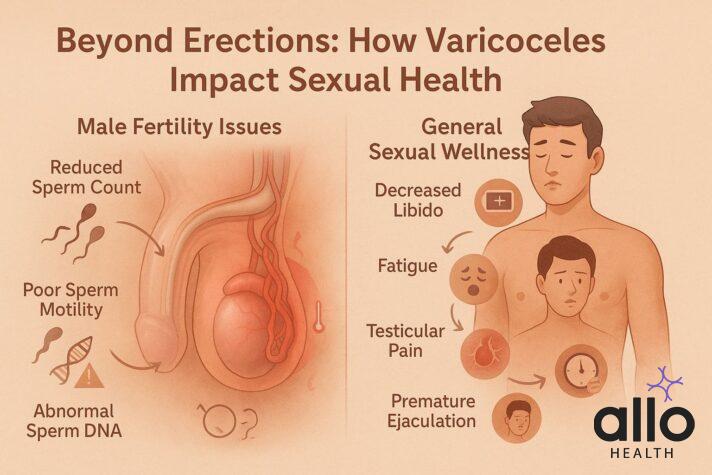Can Varicoceles Cause Erectile Dysfunction? Exploring the Link

Can varicoceles cause ED? Varicoceles are enlarged veins in the scrotum that can impact testicular health and, in some cases, contribute to erectile dysfunction (ED). While not every man with a varicocele will experience ED, the risk increases when the varicocele is large, long-standing, or linked to low testosterone. This connection is especially strong in younger men. Treating a varicocele, whether through lifestyle changes or surgery, may help improve testosterone levels and sexual function. If you're experiencing ED and have a varicocele, it's worth speaking to a doctor to explore the link and get the right treatment.
Can varicoceles cause ED? In some men, yes, it does. Understanding how is the first step toward fixing it. Varicoceles are enlarged veins in the scrotum that can quietly disrupt testicular function, lower testosterone levels, and contribute to erection issues over time.
While not everyone with a varicocele will develop erectile dysfunction, the risk is higher when symptoms like testicular discomfort or hormonal imbalance are present. In this article, we’ll break down how does varicocele cause erectile dysfunction, share what the research says, and treatment options so that you can make informed decisions about your health.
“Based on consultations with over 2.5 lakh men at Allo Health, erectile dysfunction is reported in nearly 1 out of 3 men under 40, with a wide range of contributing factors, including hormonal imbalances, stress, and varicocele-related complications.”
What are Varicoceles?

Varicoles are swollen veins in the spermatic cord in your scrotum(testicular veins). The spermatic cord is a bundle of tissues that helps hold your testicles in place. Normally, the veins in this area carry blood back up towards the heart. The valves in the blood vessel work like a one-way gate, helping blood flow in the right direction.
But if this valve becomes faulty, blood can start to collect in the veins instead of moving out. Over time, this buildup causes the veins to swell, leading to a varicocele. Varicoceles can be seen as similar to varicose veins seen in the legs. Most of the time it may not cause any symptoms at all until it gets severe but it can silently affect your sexual health
Doctors classify varicoceles by how noticeable they are:
| Grade of Varicocele | What It Means |
|---|---|
|
0 |
Found only on ultrasound (not felt or seen) |
|
I |
Felt only when bearing down (Valsalva maneuver) |
|
II |
Felt even without Valsalva maneuver |
|
III |
Clearly visible and causes a bulge in the scrotum |
Varicoceles can create a range of issues from testicular pain and swelling, to shrinking of the scrotum (testicular atrophy), but can varicocele cause erectile dysfunction? Let’s find out.
Does Varicocele Cause Erectile Dysfunction?
Yes, varicoceles can cause erectile dysfunction. But the relationship between the two is complex and indirect. While varicoceles don’t directly cause ED, its effects on male reproductive health can indirectly impact erectile dysfunction.
The main way varicoceles might lead to erectile dysfunction is by lowering testosterone levels. Varicoceles can interfere with how the testicles work, which in turn reduces the amount of testosterone production.
Studies[1] show that men with varicoceles often have lower serum testosterone compared to men without them. Research has found that men with varicoceles are over three times more likely to develop low testosterone (also known as hypogonadism).
The link was even stronger in younger men. Those aged 18 to 29 with varicoceles had a 5-fold higher risk of experiencing ED compared to those without the condition. This highlights how important it is to take varicoceles seriously, especially if you’re dealing with erection issues at a younger age.
Varicoceles and Low Testosterone

Now, how does varicocele affect testicular function? Let’s break this down.
Hormonal Imbalance
Some research[2] suggests that varicoceles may also disrupt the body’s hormonal control system. Normally, the brain and testicles work together to produce testosterone through a system called the hypothalamic-pituitary–gonadal axis.
Varicoceles can interfere with this process, affecting the Leydig cells in the testicles that are responsible for making testosterone. Over time, this may lead to hormonal imbalances and low testosterone levels.
“Internal data from Allo Health suggests that among men diagnosed with both varicocele and erectile dysfunction, 41% had clinically low testosterone levels – strengthening the hormonal link between the two conditions.”
Poor Oxygen Supply (Testicular Hypoxia)
Varicoceles can disturb normal blood flow in the testicles, which also reduces the oxygen supply. This low-oxygen environment can weaken the Leydig cells, which are responsible for testosterone production in the testicles.
Increased Testicular Temperature
Testicles are placed outside the body as they need to be at 2-3° cooler than body temperature for testosterone production. But when there is a varicocele, those enlarged veins disturb the blood circulation and act like a heat trap. This high temperature in the scrotum can damage the enzymes needed for testosterone production.
Oxidative stress
Varicoceles increase the production of harmful molecules called reactive oxygen species (ROS)[3]. When ROS levels rise and antioxidant defenses drop, it creates a stress environment that damages the cells, including Leydig cells, reducing testosterone production.
Testicular Atrophy
Varicocele leads to testicular atrophy or testicular shrinkage because of increased pressure and toxin buildup. This happens mostly in high-grade varicocele cases.
This further reduces the ability of Leydig cells to produce testosterone.
Psychological Component
Finding out you have varicoceles can be stressful. You might worry about pain, fertility, how things look, or whether it’s affecting your sexual performance. That worry alone can sometimes make things worse.
Anxiety about erectile dysfunction can contribute to erectile dysfunction. Stress and mental pressure can affect your ability to get or keep an erection because your mind and body are more connected than you might think.
Think of varicoceles like faulty plumbing if the blood isn’t flowing properly, it can lead to a heat buildup and pressure in the testicles, which may affect testosterone and, eventually, erections.
How to Know If Varicocele Erectile Dysfunction Might Be Affecting You
Here’s something that might reassure you: having varicoceles doesn’t mean you’re destined for sexual problems. In fact, most men with varicoceles go through life without any issues with erections.
Studies[4] show that while 15–20% of men have varicoceles, only a small percentage experience erectile dysfunction directly because of them.
When Can Varicocele Cause Erectile Dysfunction
The connection between varicoceles and ED becomes more likely when:
- The varicoceles are large (Grade 2 or 3) or cause noticeable symptoms
- They’re linked to low testosterone levels
- You experience testicular pain or discomfort
- Other ED risk factors are present (like obesity, diabetes, or stress)
Why Some Men Are More Susceptible
Not every man responds the same way to a varicocele. You might be more likely to experience varicocele erectile dysfunction if:
- Age: Testosterone naturally declines with age, increasing susceptibility
- Severity: Larger varicoceles generate more heat and strain on testicular function
- Duration: Long-term varicoceles may have a cumulative effect on hormone production
- Overall Health: Pre-existing hormonal or cardiovascular issues can make the impact worse
- Individual Sensitivity: Some men’s testosterone production is more sensitive to temperature changes
When to Suspect a Connection
You might consider that your varicocele is affecting your erections if you notice:
- A gradual onset of erection issues (rather than a sudden change)
- Fewer or weaker morning erections
- Low sexual desire
- Fatigue or mood changes- possible signs of low testosterone
- ED symptoms that started around the time your varicocele became noticeable
Beyond ED: Other Ways Varicoceles Affect Sexual Health

Varicoceles can impact your sexual health in several ways beyond just erectile dysfunction:
Male Fertility Issues
- Reduced Sperm Count: The increased temperature in the scrotum can negatively impact sperm production, resulting in a lower sperm count.
- Poor Sperm Motility: Even if sperm count is adequate, poor sperm motility can affect its ability to reach and fertilize an egg.
- Abnormal Sperm DNA: Varicoceles may lead to a higher proportion of abnormally shaped sperm, which can hinder fertilization.
General Sexual Health
In addition, men with varicoceles may experience a variety of symptoms that can further impact sexual health:
- Decreased Libido: Lower testosterone often results in reduced sexual interest or drive.
- Fatigue: Low energy levels can dampen sexual enthusiasm and performance.
- Aching or Throbbing Pain: Discomfort in the scrotum might lead to avoidance of sexual activity.
- Premature ejaculation: Some studies say that varicocele can also cause premature ejaculation.
Can Treating a Varicocele Improve ED?
Treating a varicocele can help improve erectile dysfunction, especially when it’s linked to low testosterone levels or testicular discomfort.
Observation and Lifestyle Changes
For men with mild symptoms, doctors may recommend regular monitoring and lifestyle changes, like:
- Wearing supportive underwear
- Avoiding heavy lifting
- Maintaining a healthy lifestyle to reduce symptoms
- Regular exercise improves circulation
- Stress management techniques
Pain Management
Over-the-counter pain relievers like acetaminophen or ibuprofen can help manage discomfort associated with varicoceles. Consulting with a healthcare provider is essential to ensure proper dosing and safety.
Surgical Intervention
Varicocelectomy:
- This is a common surgical procedure to remove or tie off the affected veins(varicocele repair)[5], thereby redirecting blood flow. It can be conducted through open surgery or minimally invasive procedures like laparoscopy, often resulting in improved blood flow and reduced symptoms.
Microsurgical Varicocelectomy:
- This approach uses a high-power microscope to ensure precision in removing the varicocele without affecting surrounding tissues and arteries. It is associated with a lower risk of complications and recurrence.
How it helps:
Enhance Testosterone Levels:
- By improving blood flow and reducing testicular temperature, surgery may help normalize hormone levels
Reduce Pain and Discomfort:
- Alleviating physical symptoms might indirectly improve sexual performance by reducing distraction or discomfort during sexual activity.
Non-Surgical Options
When surgery isn’t warranted or desired, other treatments include:
Varicocele Embolization:
- A minimally invasive procedure where a small coil or substance is inserted to block blood flow to the affected veins. This alternative can also improve testicular function.
Lifestyle Modifications:
- Simple changes like wearing looser garments, maintaining a healthy weight, and reducing stress can enhance overall well-being and may mitigate ED symptoms.
Varicocele treatment + ED-specific therapy:
- Treating varicoceles while also using medications like sildenafil (Viagra) or tadalafil (Cialis)
- Working with a counselor if anxiety is a factor
- Addressing other health issues like diabetes or high blood pressure
Case History at Allo
Rohan, a 28-year-old professional, came to Allo Health with low energy, reduced sex drive, and mild erectile dysfunction. A Grade II varicocele and low testosterone levels were identified- something he never knew could be linked.
He had also never discussed his sexual issues with his partner, a pattern we see in 38% of men.
After undergoing microsurgical varicocele repair and making simple lifestyle changes, Rohan saw significant improvement in both testosterone and erection quality within four months, joining the 71% of our patients who report better sexual function after treatment.
“I thought I had to live with it. But,I just needed the right help,” he shared in a follow-up.
Looking Forward
Varicocele erectile dysfunction is real, not always direct, but possible due to the overall impact varicoceles can have on testicular health and hormone levels. If you’re experiencing erection issues and also have a varicocele, the two may be connected. The best way to know is to get both checked by a healthcare professional. Understanding the link can help you get the right treatment, one that supports both your sexual health and overall well-being.
"The following blog article provides general information and insights on various topics. However, it is important to note that the information presented is not intended as professional advice in any specific field or area. The content of this blog is for general educational and informational purposes only.
Book consultation
The content should not be interpreted as endorsement, recommendation, or guarantee of any product, service, or information mentioned. Readers are solely responsible for the decisions and actions they take based on the information provided in this blog. It is essential to exercise individual judgment, critical thinking, and personal responsibility when applying or implementing any information or suggestions discussed in the blog."




